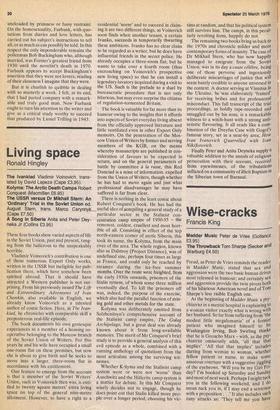Living space
Ronald Hingley
The ivankiad Vladimir Voinovich, translated by David Lapeza (Cape £3.95). Kolyma: The Arctic Death Camps Robert Conquest (Macmillan £6.95) The USSR versus Dr Mikhail Stern: An 'Ordinary' Trial In the Soviet Union ed. August Stern, trans. Marco Carynnyk (Cape £7.50) A Song in Siberia Anita and Peter Deyneka Jr (Collins £3.95) These four books show varied aspects of life in the Soviet Union, past and present, ranging from the ludicrous to the unspeakably horrible.
Vladimir Voinovich's contribution is one of those numerous Export Only works, written in the USSR but ineligible for publication there, which have somehow been spirited abroad. That it should have attracted a Western publisher is not surprising. From his previously issued The Life and Extraordinary Adventures of Ivan Chonkin, also available in English, we already know Voinovich as a talented author of comic fiction. Here, in The Ivankiad, he chronicles with comparable skill a preposterous real-life episode.
The book documents his own grotesque experiences as a member of a housing cooperative belonging to the Moscow branch of the Soviet Union of Writers. For five years he and his wife have occupied a small one-room flat on these premises, but now she is about to give birth and he Seeks to move into a larger, three-room flat in accordance with his entitlement.
One feature to emerge from the account is that a member of the Soviet Writers' Union, such as Voinovich then was, is entitled to twenty square metres' extra living space on top of the general nine-metre allotment. However, to have a right to a residential 'norm' and to succeed in claiming it are two different things, as Voinovich soon finds when another tenant, a certain Ivanko, succeeds in temporarily thwarting these ambitions. Ivanko has no clear claim to be regarded as a writer, but he does have influential friends in the secret police. He already occupies a three-room flat, but he wants to take over a fourth room (thus encroaching on Voinovich's prospective new living space) so that he can install a legendary lavatory acquired during a visit to the US. Such is the prelude to a duel by bureaucratic procedure that is not only hilarious, but may even surprise the citizens of regulation-tormented Britain.
The book is valuable for far more than its humour owing to the insights that it affords into aspects of Soviet everyday living absent from the officially approved literature and little ventilated even in other Export Only memoirs. On the penetration of the Moscow Union of Writers by former and serving members of the KGB, on the means whereby manuscripts are published in consideration of favours to be expected in return, and on the general parameters of battle by committee a la russe, this Red Dunciad is a mine of information, expelled from the Union of Writers, though whether he has had to move again and just what professional disadvantages he may have suffered is far from clear.
There is nothing in the least comic about Robert Conquest's book. He has had the useful idea of ODM pil in g a general study of a particular sector in the Stalinist concentration camp empire of 1930-55 — the remotest, coldest, cruellest and most horrible of all. Consisting in effect of the top north-eastern corner of arctic Siberia, this took its name, the Kolyma, from the main river of the area. The whole region, known also as Dalstroy (Project Distance), was of undefined size, perhaps four times as large as France, and could only be reached by steamer during the ice-free summer months. Over the route were freighted, from the early 1930s onwards, prisoners of the Stalin system, of whom some three million eventually died. To kill the prisoners off was, indeed, the purpose of the exercise, which also had the parallel function of mining gold and other metals for the state.
Kolyma was deliberately omitted from Solzhenitsyn's comprehensive account of the Stalinist camp empire, The Gulag Archipelago, but a great deal was already known about it from long-available memoirs. The merit of Mr Conquest's brief study is to provide a general analysis of this evil episode as a whole, combined with a running anthology of quotations from the most articulate among the surviving witnesses.
Whether Kolyma and the Stalinist camp system were or were not 'worse' than Auschwitz and the Flitlerite camp system is a matter for debate. In this Mr Conquest wisely decides not to engage, though he does point out that Stalin killed more people over a longer period, choosing his vic tims at random, and that his political system still survives him. The camps, in this peculiarly revolting form, happily do not.
The remaining two books bring us back to the 1970s and chronicle milder and more contemporary forms of insanity. The case of Dr Mikhail Stern, who has now happily managed to emigrate from the Soviet Union, was in its day a cause Mare, being one of those perverse and ingeniously deliberate miscarriages of justice that will seem barely credible to anyone unversed in the context. A doctor serving at Vinnitsa fl the Ukraine, he 'was elaborately 'framed for receiving bribes and for professional misconduct. This full transcript of the trial proceedings, as boldly tape-recorded and smuggled out by his sons, is a remarkable witness to a witch-hunt with a strong antisemitic flavouring. It all reads like a com
bination of the Dreyfus Case with Gogol's famous story, set in a near-by area, How Ivan Ivanovkh Quarrelled with Ivan Nikiforovich.
Finally Peter and Anita Deyneka supply a valuable addition to the annals of religious persecution with their account, received from eyewitnesses, of the tribulations inflicted on a community of illicit Baptists In the Siberian town of Barnaul.


































 Previous page
Previous page